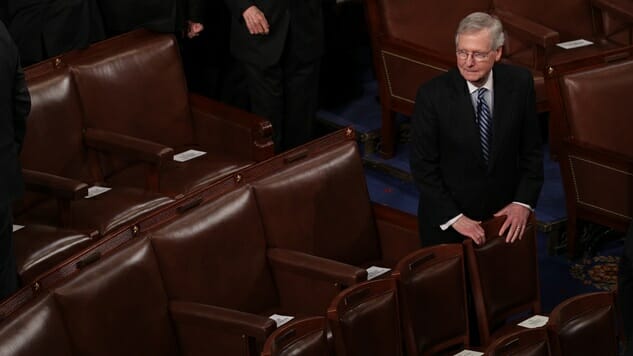Could Lisa Murkowski’s Split With Mitch McConnell Bring Us Closer to a Fair Trial?
Photo courtesy of Getty
Mitch McConnell has outright admitted that he won’t be impartial in the upcoming Senate impeachment trial, and that he’ll be working with White House counsel to run the show the way they want, which includes not calling key witnesses like Mike Pompeo and Michael Duffy and Mick Mulvany. That’s an insane idea to begin with, and one that looks even more corrupt based on recent emails obtained by FOIA request surrounding the Ukraine scandal. Yet if there’s one thing we know from recent history, it’s that Republicans operate in unison (with rare exceptions), especially in the Senate. Add in the fact that they’re all petrified of pissing off their Trump-loving bases, and you have a formula for obedience to Mitch.
The one little piece of dissent so far came from Alaska’s Lisa Murkowski, who said the following in a recent interview after hearing McConnell’s comments:
“I was disturbed. To me, it means that we have to take that step back from being hand in glove with the defense, and so I heard what Leader McConnell had said, I happened to think that that has further confused the process.”
Of course, Republicans came down on her like a pile of bricks, but some, like Democratic senator Richard Blumenthal, believe it’s showing cracks in the facade. Watch his Thursday appearance on CNN in which he tries to support this theory:
Democratic @SenBlumenthal says GOP Sen. Lisa Murkowski’s comments about being “disturbed” by Sen. Mitch McConnell’s impeachment coordination with the White House “reflect cracks in the implacable McConnell wall… her courage could be contagious.” https://t.co/rkavqHMJgTpic.twitter.com/iDBbY3qGWZ
— The Situation Room (@CNNSitRoom) December 26, 2019
Now, the extent to which you believe this largely depends on whether you believe Murkowski was actually dissenting or just taking issue with the dreaded optics. As in, she knows she’ll acquit Donald Trump, but would prefer that it doesn’t look quite as openly shady and collusive as McConnell advertised. However, even if you take the pessimistic angle, Blumenthal raises one excellent point—once you compel the Mulvaneys/Duffeys/Pompeos of the world to testify, things can get out of hand in a hurry, and new evidence might be introduced that makes it even more awkward for Republican senators to acquit. McConnell knows that, and so does the White House, which is why they’re doing their damndest to keep those men locked away. In that sense, Murkowski’s qualms can be read as legitimately substantive, provided she actually thought about it before she spoke—making noises about expanding the breadth of the trial, and about the justice of having real testimony from the main players, could be a slippery slope toward learning the kind of truths that can’t be ignored.
The big problem for Democrat is that unlike their rare victory on Obamacare, the current breakdown isn’t as close. Republicans hold a 53-47 advantage, and asking for four GOP senators to go against McConnell is asking for the universe; you may hear the usual bleatings of free thought from the likes of Susan Collins, but aside from she and Murkowski, who would be willing to stand alone?
There’s no clear answer at the moment, and until at least one more voice emerges, it’s a safe bet still that McConnell is going to have his way.







































